What means neoliberalism
> Jobernstein
> Reconquest
Neoliberals are yet another group of individuals which believe to infallibly be in possession of the truth. What they have recognized as being the truth, is essentially a matter of competition, power and profit.
In pursuit of their aims, they think they have the privilege to act without compliance with laws and ethical considerations. The core of this ideology is the belief that a tiny minority of super riches can dominate the masses at will, if those are out of funds.
The dirty secret of capitalism. ON CONTACT: A History of Neoliberalism, Part I. ON CONTACT: A History of Neoliberalism, Part 2. This Is Neoliberalism ▶︎ Introducing the Invisible Ideology (Part 1)
This Is Neoliberalism ▶︎ Keynesian Embedded Liberalism (Part 2)
This Is Neoliberalism ▶︎ Hayek and the Mont Pelerin Society I: 1918 - 1939 (Part 3)
Wrong all along: Neoliberal IMF admits neoliberalism fuels inequality and hurts growth. The world’s largest evangelist of neoliberalism, the International Monetary Fund, has admitted that it’s not all it’s cracked up to be.
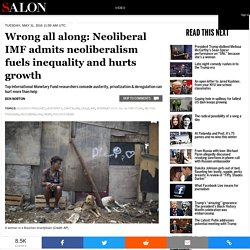
Neoliberalism refers to capitalism in its purest form.
The President of Belgian Magistrates: Neoliberalism is a form of Fascism. Neoliberalism is a species of fascism By Manuela Cadelli, President of the Magistrates’ Union of Belgium The time for rhetorical reservations is over.
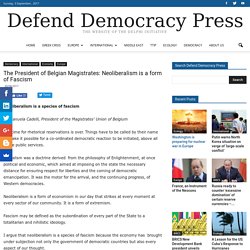
Things have to be called by their name to make it possible for a co-ordinated democratic reaction to be initiated, above all in the public services. Liberalism was a doctrine derived from the philosophy of Enlightenment, at once political and economic, which aimed at imposing on the state the necessary distance for ensuring respect for liberties and the coming of democratic emancipation.
EPL Presents Chris Hedges. Neoliberalism – the ideology at the root of all our problems. Imagine if the people of the Soviet Union had never heard of communism.
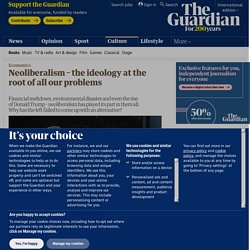
The ideology that dominates our lives has, for most of us, no name. Mention it in conversation and you’ll be rewarded with a shrug. Even if your listeners have heard the term before, they will struggle to define it. Neoliberalism: do you know what it is? Its anonymity is both a symptom and cause of its power. So pervasive has neoliberalism become that we seldom even recognise it as an ideology. Neoliberalism sees competition as the defining characteristic of human relations.
Attempts to limit competition are treated as inimical to liberty. We internalise and reproduce its creeds. Never mind structural unemployment: if you don’t have a job it’s because you are unenterprising.
Neoliberal Psychology - Resilience. 1: The Basics by Beginner's Neoliberalism. Neoliberalism. CorpWatch : What is Neoliberalism?
"Neo-liberalism" is a set of economic policies that have become widespread during the last 25 years or so.
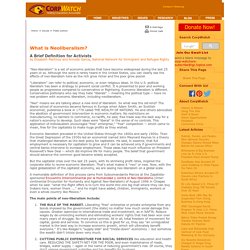
Although the word is rarely heard in the United States, you can clearly see the effects of neo-liberalism here as the rich grow richer and the poor grow poorer. "Liberalism" can refer to political, economic, or even religious ideas. In the U.S. political liberalism has been a strategy to prevent social conflict. It is presented to poor and working people as progressive compared to conservative or Rightwing. Economic liberalism is different. "Neo" means we are talking about a new kind of liberalism.
The Strange Non-Death of Neoliberalism, by Colin Crouch. An Economist examines the puzzling and tenacious hold of Neo-Liberalism on the public mind It all began, perhaps unfairly, with Austrian economist Friedrich von Hayek | Photo: Wikicommons Rewriting Reality: Colin Crouch on Neo-Liberalism Neo-Liberalism is one of those concepts about which people have strong opinions, even if (or because) they are hazy as to its exact meaning.
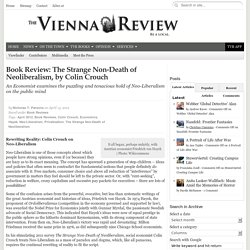
The concept has spawned a generation of step-children – ideas and policies that often seem to contradict the fundamental notions that people definitely do associate with it: Free markets, consumer choice and above all reduction of “interference” by government in matters they feel should be left to the private sector. Or, with “rent-seeking”, reduction in welfare, crony capitalism and excessive pay packets for executives – there are lots of possibilities!
Crouch’s account of deregulation is full of insights, and they are not attractive ones. Order this book online. Ménage à Trois. The Strange Non-Death of Neoliberalism. Colin Crouch urges us to rethink the role of giant corporations in the state vs market analysis of neoliberalism Neoliberalism has ruled the Western world and most of the globe since the 1970’s. It is based on a market-driven approach to monetary policy and it promotes control of the economy by the private sector, which is supposedly more efficient than the public sector.
The Cracks Begin To Show in The UK Economy (1/2)
Bio John Weeks is a professor emeritus of the University of London's School of Oriental and African Studies and author of Economics of the 1%: How Mainstream Economics Serves the Rich, Obscures Reality and Distorts Policy.
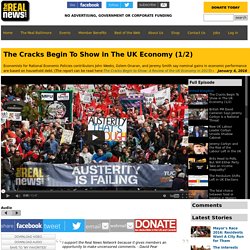
His recent policy work includes a supplemental unemployment program for the European Union and advising the central banks of Argentina and Zambia. Ozlem Onaran is Professor of Economics at the University of Greenwich in the U.K. She regularly publishes research studies on globalization, income distribution, and business investment in publications such as the Cambridge Journal of Economics and Labour.
A Brief Examination of Neoliberalism and Its Consequences - Sociology Lens. Starting in the second half of the 20th century, neoliberalism became increasingly prominent as a form of governance in countries around the world (Peters 2001).
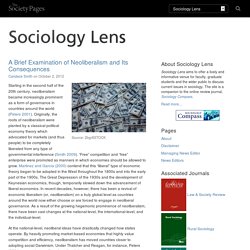
Originally, the roots of neoliberalism were planted by a classical political economy theory which advocated for markets (and thus people) to be completely liberated from any type of governmental interference (Smith 2009). “Free” competition and “free” enterprise were promoted as manners in which economies should be allowed to grow. Martinez and García (2000) contend that this “liberal” type of economic theory began to be adopted in the West throughout the 1800s and into the early part of the 1900s. The Great Depression of the 1930s and the development of Keynesian economics, though, temporarily slowed down the advancement of liberal economics. At the national-level, neoliberal ideas have drastically changed how states operate.
Eine Million Jobverluste in Deutschland? Zur Diskussion über die Beschäftigungseffekte von Mindestlöhnen
NOAM CHOMSKY, NYPL, 26 April. Builder Sir Robert McAlpine denies keeping blacklist. The construction company Sir Robert McAlpine has admitted to a high court judge before a hearing this week that a database of names and information held on workers over decades helped it "keep an eye" on individuals, but it denies that the data amounted to an employment blacklist.
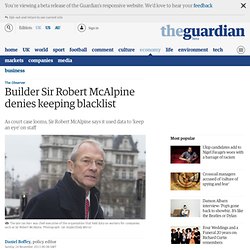
The firm, which along with others allegedly used the store of information to keep 3,300 workers out of the industry, says that where negative information was held, it was merely used to help the company keep an eye out for future dangerous or unlawful activity.
The Volkswagen emissions scandal explained. Walmart employee fired for redeeming $2 of cans finds groundswell of support. An Albany-area Walmart employee fired from his job for redeeming $2 worth of cans he collected while gathering shopping carts in the store’s parking lot has drawn widespread sympathy and support on social media.
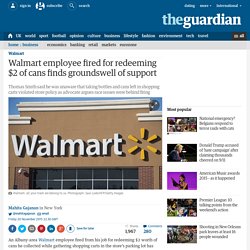
Thomas Smith, 52, told the Albany Times Union that he was fired in early November for redeeming a total of $5.10 worth of cans and bottles on two occasions, and said he was unaware that doing so violated store policy. Support for Smith grew after a story on his termination from the Albany Times Union. A GoFundMe drive for Smith set up by Dounya Hamdan, of Chicago, has nearly reached the $5,000 goal as of Friday afternoon. On the day he was fired, Smith, a formerly homeless ex-convict who has a learning disability, had stayed three hours past the normal end of his shift, having agreed to work extra time on a day when the East Greenbush, New York, store was short-staffed.
“I didn’t know you couldn’t take empties left behind.
VW admits emissions scandal was caused by 'whole chain' of failures. Volkswagen has admitted for the first time that the diesel emissions scandal was the result of a collection of failures within the company, rather than just the actions of rogue engineers.
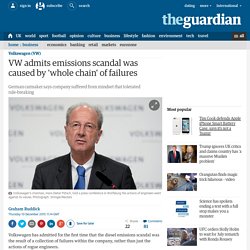
Hans Dieter Pötsch, the VW chairman, said there had been a “whole chain” of errors at the German carmaker and there was a mindset within the company that tolerated rule-breaking. VW provided the most detailed explanation so far about how the diesel emissions scandal occurred at a press conference in Germany.
Timeline: Barclays' widening Libor-fixing scandal. 6 February 2013Last updated at 11:51 Libor, the London inter-bank lending rate, is considered to be one of the most crucial interest rates in finance. It underpins trillions of pounds worth of loans and financial contracts. So, when Barclays was fined £290m in June last year after some of its derivatives traders were found to have attempted to rig this key rate, already weak public confidence in banks was harmed further.
The scandal led to the resignation of both Barclays chief executive Bob Diamond and chairman Marcus Agius. Here are some of the key dates in the scandal: As early as 2005 there was evidence Barclays had tried to manipulate dollar Libor and Euribor (the eurozone's equivalent of Libor) rates at the request of its derivatives traders and other banks.
Misconduct was widespread, involving staff in New York, London and Tokyo as well as external traders.
The Scam Wall Street Learned From the Mafia. Rubikon - Magazin für die kritische Masse. Der Spiegel (Nr. 30 vom 22.7.2017) berichtet von Kartellabsprachen „mindestens seit den 1990er Jahren, bis zum heutigen Tage“ und beruft sich auf die Selbstanzeige von VW vom 4.7.2016.
Kleinbäuerin gegen GroßkonzernMegabergbau in Nordperu – Deine Korrespondentin. The Ideological Crisis of Western Capitalism - Joseph E. Stiglitz. Exit from comment view mode. Click to hide this space NEW YORK – Just a few years ago, a powerful ideology – the belief in free and unfettered markets – brought the world to the brink of ruin. Even in its hey-day, from the early 1980’s until 2007, American-style deregulated capitalism brought greater material well-being only to the very richest in the richest country of the world.
Indeed, over the course of this ideology’s 30-year ascendance, most Americans saw their incomes decline or stagnate year after year. Moreover, output growth in the United States was not economically sustainable. I was among those who hoped that, somehow, the financial crisis would teach Americans (and others) a lesson about the need for greater equality, stronger regulation, and a better balance between the market and government. In the US, this right-wing resurgence, whose adherents evidently seek to repeal the basic laws of math and economics, is threatening to force a default on the national debt.
How Did Economists Get It So Wrong?
Our Economic Ruin Means Freedom for the Super-Rich by George Monbiot. The model is dead; long live the model. Austerity programmes are extending the crises they were meant to solve, yet governments refuse to abandon them. The United Kingdom provides a powerful example. The cuts, the coalition promised, would hurt but work. They hurt all right – and have pushed us into a double-dip recession. This result was widely predicted. Two questions arise.
Conservative fantasies on the miracles of market. Austin, TX - A central doctrine of evangelicals for the "free market" is its capacity for innovation: New ideas, new technologies, new gadgets - all flow not from governments, but from individuals and businesses, allowed to flourish in the market, we are told.
That's the claim made in a recent op-ed in our local paper by policy analyst Josiah Neeley of the Texas Public Policy Foundation, a conservative think-tank in Austin. His conclusion: "Throughout history, technological advances have been driven by private investment, not by government fiat. There is no reason to expect that to change anytime soon.
"
How The Bush Tax Cuts Blew Up The Deficit And Debt
Debt deal: anger and deceit has led the US into a billionaires' coup. There are two ways of cutting a deficit: raising taxes or reducing spending.
Neo-liberal capture of the policy making process in Europe. Corporate power has turned Britain into a corrupt state. U.S. Profits Per Employee Jump As Raises Remain Modest: Study. Companies are squeezing greater profits out of their employees, even as layoffs rise and the outlook for hiring and raises remains mixed, a recent study has found.
Profits per employee have gone up for the second year in a row, according to a study by the financial analysis company Sageworks, suggesting that companies continue to get more out of their employees as they slash their payrolls in an effort to get leaner.
Men's Earnings Haven't Just Stagnated Over Past 40 Years. January 15, 2012 | Like this article? Join our email list:
IMF continues with its wage-cutting line.
The use of austerity.
Dr. Guido G. Preparata: They Want to Turn Us All into A Global Society of Termites. Mohsen Abdelmoumen: Your book "Conjuring Hitler" received a laudatory criticism of our friend Peter Dale Scott.
'The Gig Economy' Is the New Term for Serfdom. Why are we debating cuts to Social Security? - Opinion. Wage slavery. Latest figures reveal more than 40 million people are living in slavery. Up to 13,000 working as slaves in UK. Britain's Modern Slave Trade - Al Jazeera English. Executive Excess 2011: The Massive CEO Rewards for Tax Dodging. Raise Taxes on Rich to Reward True Job Creators: Nick Hanauer. Emmanuel Saez and Thomas Piketty.
Hearing Offshore Tax Evasion Panel 1. $21tn: hoard hidden from taxman by global elite. Starbucks and Fiat Chrysler's tax avoidance deals to be ruled illegal. Uber pays £22,000 tax on £866,000 UK profit. What are the Paradise Papers and what do they tell us?
Wie Konzerne Europas Kassen plündern!– netzfrauen. Financial Totalitarianism: The Economic, Political, Social and Cultural Rule of Speculative Capital. Global Poverty: How the Rich Eat the Poor and the World.










